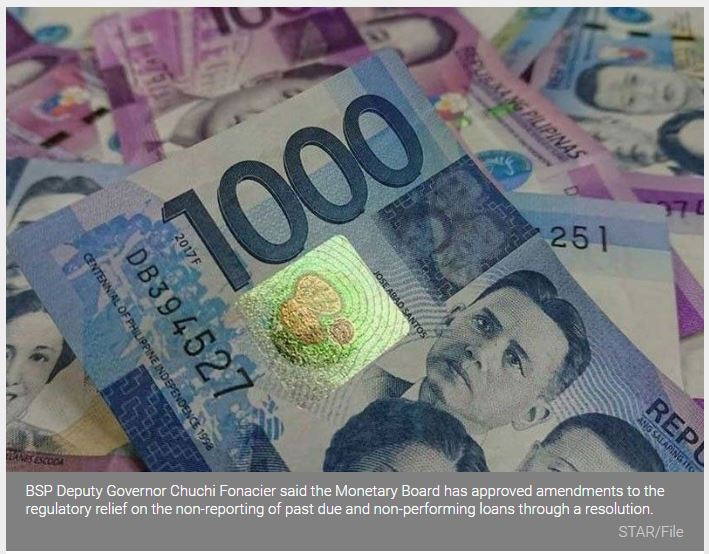Philippines: Loan reclassification period cut
For clearer view of pandemic impact on banks
MANILA, Philippines — The Bangko Sentral ng Pilipinas (BSP) has shortened to end-December the time given to banks to reclassify loans to borrowers as past due and non-performing, to see a clearer picture of the impact of the COVID-19 pandemic on the banking sector.
BSP Deputy Governor Chuchi Fonacier said the Monetary Board has approved amendments to the regulatory relief on the non-reporting of past due and non-performing loans (NPLs) through a resolution.
Under the new resolution, Fonacier said the period allowing BSP-supervised financial institutions (BSFIs) to exclude loans of borrowers affected by the COVID-19 pandemic from being reclassified as part due and non-performing has been shortened to end-December this year instead of end-December next year.
“Upon grant by BSFIs of a temporary grace period for payment or upon approval of the restructuring, but subject to reporting to BSP, exclusion from the past due and non-performing classification, the loans of borrowers in affected areas which should have been reclassified as past due as of March 8, the date of declaration of the President of the state of public health emergency under Presidential Proclamation 922, including those loans becoming past due or non performing until Dec. 31, 2020,” Fonacier stated in Memorandum 2020-087.
As part of the regulatory relief for banks and other financial institutions, the BSP issued Memorandum 2020-008 on March 14, allowing banks to exclude loans in affected areas from the past due and non-performing classifications only for one year or until March 8, 2021.
In April, the regulator issued Memorandum 2020-032 giving BSFIs more time to reclassify loans of borrowings as part due and non-performing until Dec. 31, 2021 instead of March 8.
The BSP has directed banks to implement prudent operational control measures as documentary requirements for the restructuring of loans may be waived.
As a general rule, loans, investments, receivables, or any financial asset, including restructured loans, are considered past due when any principal and/or interest or installment due, or portions thereof are not paid at their contractual due date. However, banks may provide a cure period on a credit product-specific basis, not to exceed 30 days to allow borrowers to catch up on their late payment.
On the other hand, loans are considered non-performing if any principal or interest are unpaid for more than 90 days from contractual due date.
Borrowers have been granted another 60-day debt moratorium or until end December this year under Republic Act 11494 or the Bayanihan to Recover as One Act (Bayanihan II).
Preliminary data from the central bank showed the gross NPL ratio of Philippine banks rose further to 3.4 percent in end-September from 2.84 percent in August as restructured and past due loans continued to soar amid the economic fallout caused by the pandemic. This was the highest gross NPL ratio since the 3.41 percent booked in July 2013.
The bad loan ratio of local banking industry has steadily increased since the 2.16 percent recorded in January due to the impact of the pandemic. The ratio ranged from three to 3.4 percent in the first half of 1997 or prior to the Asian financial crisis, but peaked at 18.6 percent in 2001.
Source: https://www.philstar.com/business/2020/12/09/2062395/loan-reclassification-period-cut


 English
English




